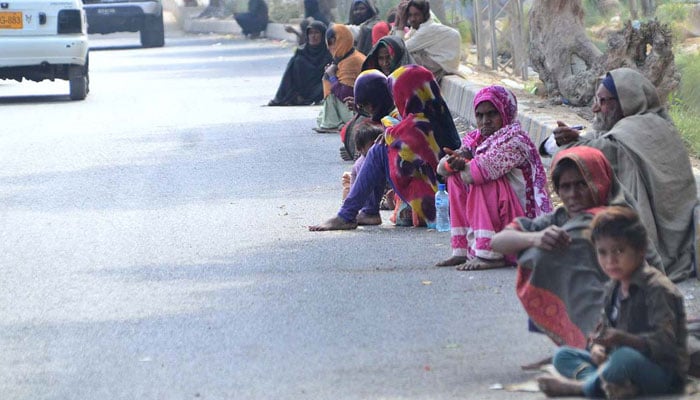By: Asadullah Mahesar
The Print reported in 2024 that more than 4 lac beggars moved to Karachi merely during the Holy month of Ramzan. The beggary system, a phenomenon having deep socioeconomic and cultural roots, is an ongoing concern in Pakistan, it does not reflect the nation’s economic inequalities and inefficiencies but also poses significant challenges to social welfare and urban administration.
Beggaring has a long history in South Asian societies, where charity was seen as a noble deed in both pre-Islamic and Islamic cultures. But what was formerly intermittent and accepted in culture has now become a widespread socioeconomic problem. Over the decades, rapid urbanization, population growth, and economic challenges have contributed to the proliferation of beggary in Pakistan, now it becomes a profession rather than a necessity for pickpocketing in the name of poverty and Muslim brotherhood.
According to Dawn, there are an estimated 38 million beggars out of 245 million of Pakistan’s population. On average, a beggar in Karachi collects around Rs2,000 per-day, compared to Rs1,400 in Lahore and Rs950 in Islamabad. The national daily average stands at Rs850 per beggar. Another recent report reveals that these beggars collectively extract Rs32 billion daily in the name of charitable donations from the public pocket. It amounts to a shocking Rs117 trillion annually, which is approximately $42 billion. Additionally, the Overseas Ministry of Pakistan has reported that a significant number of beggars are moving abroad. In 2023, 90% of beggars arrested in foreign countries had identified as Pakistani origin.
The Economic Survey of Pakistan 2023-24 reported that the unemployment rate in Pakistan stood at 6.3% in 2024, with an unemployment population of 4.51 million which is significantly higher. Moreover, the Pakistan Bureau of Statistics (PBS), reported in May 2024 that the inflation rate soared to over 11.8%, however, it is only documented but the real figure is extensively high. Similarly, this ratio was the highest recorded at 29.18% in 2023 making it difficult for many households to survive. These economic conditions provide fertile ground for the enhancement of the beggary system in the country.
A survey conducted by the Punjab government in 2021 estimated that there are over 10,000 beggars in Lahore alone, with similar numbers reported in other major cities. This data highlights the extensive reach of the issue, affecting not just the individuals directly involved but the broader urban population as well.
Beggary system complicates urban management and planning. Public spaces like parks, markets, mosques, shrines, and transportation hubs often become hotspots for beggars, affecting the usability and attractiveness of these areas. Beggars are frequently treated with a mixture of contempt and sympathy that lead them to be further marginalized. This humiliation impedes efforts to integrate them into society and address their underlying issues, while beggary itself does not significantly strain the economy. Additionally, the presence of organized begging syndicates diverts potential economic contributions from more productive activities.
Various initiatives have been undertaken by the government and non-governmental organizations (NGOs) to address beggary. Pakistan Baitul Mal was established in 1992 to alleviate poverty through various initiatives, including providing support to the destitute, widows, orphans, individuals with disabilities, and other vulnerable members of society. Laws such as the Punjab Vagrancy Ordinance (1958) and the Sindh Children Act (1955) exist but are often inadequately enforced. Insincerity, corruption and lack of resources hinder effective implementation to prevent such activities. In Punjab, the government has established Child Protection Bureaus to rescue child beggars and provide them with education and psychological support. These institutions work in collaboration with law enforcement agencies to dismantle begging organizations that exploit children.
Similarly, the government has established rehabilitation centers and vocational training programs aimed at reintegrating beggars into society. However, these efforts are often unsuccessful due to inadequate funds and poor administration. Moreover, numerous NGOs work to provide food, shelter, education, and healthcare to beggars. But unfortunately, they are unsuccessful in eradicating the curse of the beggary system from society. It has been observed that the state does not have a serious intention to eliminate such a curse from society because the state itself has benefited from such activities.
To address these challenges, a multifaceted approach is required such as enhancing the capacity and integrity of law enforcement agencies to demolish organized begging networks and enforce existing laws. Implementing policies to reduce unemployment and inflation and expanding social safety gains to support vulnerable populations. Allocating more resources to rehabilitation programs and ensuring their proper management and accountability. Educating the public about the negative impacts of giving money directly to beggars and encouraging donations to reputable charities instead.
The writer is a freelance columnist. He can be reached at [email protected]






